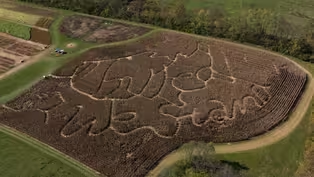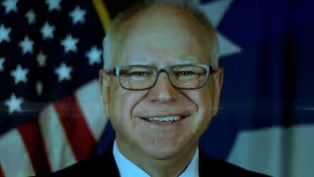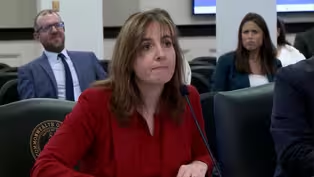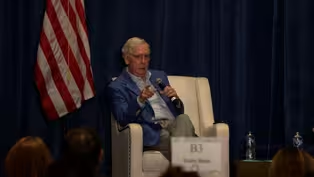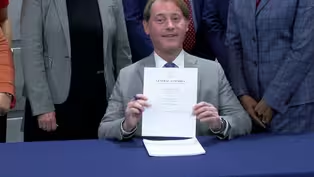
Discussing Kentucky's Medical Cannabis Program
Clip: Season 3 Episode 105 | 5m 17sVideo has Closed Captions
Voters in more than 100 cities and counties across Kentucky will be asked to vote on questions...
Early, in-person, non-excuse voting for the General Election begins next week. Voters in more than 100 cities and counties in Kentucky will be asked to vote on questions dealing with medical marijuana. Renee Shaw talks with Sam Flynn, Executive Director of the Kentucky Office of Medical Cannabis, who says local jurisdictions can approve or reject business operations of licensed medical marijuana g
Problems playing video? | Closed Captioning Feedback
Problems playing video? | Closed Captioning Feedback
Kentucky Edition is a local public television program presented by KET

Discussing Kentucky's Medical Cannabis Program
Clip: Season 3 Episode 105 | 5m 17sVideo has Closed Captions
Early, in-person, non-excuse voting for the General Election begins next week. Voters in more than 100 cities and counties in Kentucky will be asked to vote on questions dealing with medical marijuana. Renee Shaw talks with Sam Flynn, Executive Director of the Kentucky Office of Medical Cannabis, who says local jurisdictions can approve or reject business operations of licensed medical marijuana g
Problems playing video? | Closed Captioning Feedback
How to Watch Kentucky Edition
Kentucky Edition is available to stream on pbs.org and the free PBS App, available on iPhone, Apple TV, Android TV, Android smartphones, Amazon Fire TV, Amazon Fire Tablet, Roku, Samsung Smart TV, and Vizio.
Providing Support for PBS.org
Learn Moreabout PBS online sponsorshipEarly in-person no excuse voting for the general election starts a week from today and voters and more than 100 cities and counties across Kentucky will be asked to vote yes or no on a questing dealing with medical marijuana.
Kentucky's new medical cannabis program will go into effect January.
First of next year.
Local jurisdictions can approve or reject business operations of licensed medical marijuana growers dispensaries and processors.
We learn more about that in part 2 of my interview with Sam Flynn, executive director of the Kentucky Office of Medical Cannabis recorded earlier this week.
So you've talked to us about how some jurisdictions have chosen to do.
>> Different routes when it's on the ballot is the question ubiquitous is that universal that it will appear in the same man and Henderson County as it could and Pike Fuller Pike County.
>> Absolutely.
So the question is exactly the same across the board.
So care us to a team.
Be one 30.
It's the statutory provision where this is set out by the General Assembly in law here in Kentucky lays out that the question is the uniform question throughout the commonwealth.
So everybody will be saying yes or no on whether cannabis businesses can operate in those 103 jurisdictions.
It'll be voting on it.
>> So as the Office of Medical Cannabis, are you all charged?
This is interesting.
Are you all charged with keeping tally of who says yes.
And who says no wars of the state Board of elections.
>> So the state Board of Elections is is tasked like with any election with keeping tally on how that vote goes.
We're tracking in our offices for purposes of knowing whether a local businesses are medical.
Cannabis businesses can operate in certain jurisdictions.
So down the road, for example, we're going to be having a license lottery next Monday, October 28th at 02:00PM at the Kentucky Lottery Corporation.
We're 26 businesses will be approved to get a license here in the Commonwealth.
Kentucky cultivators and processors and some of them may be located in a jurisdiction that ultimately decides at the Balad to opt out.
Yeah, what happens?
So we've provided flexibility through some guidance that we have and regulatory flexibility that we have to allow those businesses that are affected or impacted by a vote like that to move to another jurisdiction that allows medical cannabis relations.
So the General Assembly has has provided this mechanism to protect local governments and allow them to make the best decisions for their communities and let their board the voters voices be heard.
And we want to provide some regulatory flexibility to allow those businesses to if they get a license to be able to move to another jurisdiction allows for this and the outcome just a beak.
>> Clear again does not impact where a card holder.
And possess and use medical marijuana.
That's correct.
So medical cannabis card holders here in the Commonwealth.
>> Though they'll be able to get a written certification starting December first of this year from their physician and then beginning January.
1st next year, they'll be able to get their digital registry identification card.
>> They'll then be able to purchase medical cannabis.
At some point from dispensaries, anywhere in the commonwealth.
If they choose and they'll be able to use that anywhere in the Commonwealth.
Of course, there are some restrictions on different types of products, for example, vaporization products can be used and public accommodations on public transportation, smoking of medical cannabis is completely prohibited, but you will be able to consume some medical cannabis products anywhere in the in the Kabul.
Okay.
>> What are the concerns that local governments have expressed and asked you about right as they try to get to wherever approach they decided to handle this.
Certainly.
I really appreciate you asked that question.
So it's a great question and something that that came up when I first came on board this project back in June of began reaching out to local government officials hear their concerns.
>> And what they expected and anticipated from this program.
And one of the main concerns was, you know, they didn't want to see these popping up these dispensers popping up.
A vape shops on on every corner.
Some of them would, you know, say that they've been to, you know, Colorado, where they've been to Michigan or they've been the Oklahoman, you know, they see see medical, cannabis or cannabis everywhere.
And we wanted to make sure that our program was limited in scope and that her in terms of 50's businesses would not be on every single quarter.
So we have limited the dispensaries.
48 across the state, they are spread out.
We have 11 licensing regions there based on the drive time analysis.
We wanted to have access everywhere in the state.
We already have medicine deserts.
We didn't want to have deserts for for the specific folks, but ultimately we want to make sure that it was secure and communities.
So again, we limited to no more than one per county except for Jefferson and Fayette County, which, of course, are largest population centers.
>> And they have to.
That's correct.
♪ ♪ ♪ ♪
Video has Closed Captions
Clip: S3 Ep105 | 2m 47s | Owners of a Bourbon County farm use a corn maze to spell out a special message. (2m 47s)
Video has Closed Captions
Clip: S3 Ep105 | 3m 28s | Debate over mandating fluoride in drinking water resurfaces in Frankfort. (3m 28s)
Gov. Walz Brings Presidential Campaign to Kentucky
Video has Closed Captions
Clip: S3 Ep105 | 2m 33s | Gov. Tim Walz stopped in Louisville on Wednesday to campaign for Kamala Harris. (2m 33s)
Video has Closed Captions
Clip: S3 Ep105 | 1m 6s | Auditor Allison Ball launching investigation into funding of SB 151 (1m 6s)
McConnell Distancing Self from Trump Policy
Video has Closed Captions
Clip: S3 Ep105 | 3m 28s | Sen. McConnell is distancing himself from economic policies of both... (3m 28s)
Momnibus Bill Ceremonial Signing
Video has Closed Captions
Clip: S3 Ep105 | 3m 8s | Sec. of State Michael Adams ceremoniously signs the so-called "Momnibus Bill." (3m 8s)
Providing Support for PBS.org
Learn Moreabout PBS online sponsorship
- News and Public Affairs

Top journalists deliver compelling original analysis of the hour's headlines.

- News and Public Affairs

FRONTLINE is investigative journalism that questions, explains and changes our world.












Support for PBS provided by:
Kentucky Edition is a local public television program presented by KET
